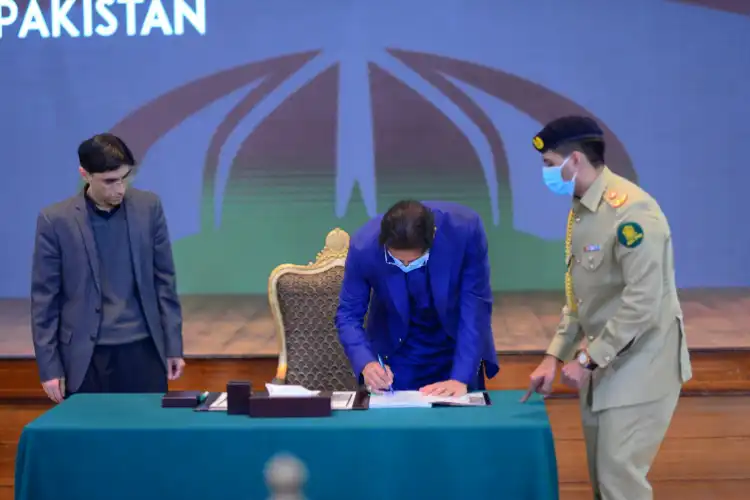
J K Tripathi
After much speculations in the Pakistani and the Indian media, Imran Khan Niyazi, Prime Minister unveiled the country’s first National Security Policy. It has taken seven years for them to formulate the Policy.
Therefore, Imran Khan cannot solely take credit for it. In the selective leaks from the NSP document that remains largely classified, it turns out that it has a significant sentence: “We cannot go on fighting India for hundred years…. We should develop trade ties with India to become economically sustainable”.
It’s this part of the document that created a false impression in some sections of Indian media that Pakistan has softened its stance towards India. It understandably generated criticism in the Pakistani media against the government for “surrendering the Kashmir issue to India.” However, a careful reading of the document belies all hopes of Pakistan extending an olive branch to India.
The 62-page published part of the document has messages from the PM and the NSA, an executive summary, and eight chapters namely Policy Formulation, National Security Framework, National Cohesion, Securing the Economic Future, Defence and Territorial Integrity, Internal Security, Foreign Policy in a Changing World and Human Security. This policy would be in force initially for five years and is subject to “review and update annually or with the change in the government or case of any major event having implications on Pakistan’s security.”
It boasts of being a comprehensive security policy containing the “traditional as well as non-traditional elements of security.” Though the executive summary talks of the “vertical inequalities” and “horizontal inequalities” and suggests addressing the external imbalance of foreign exchange by export growth and export-oriented FDI, the details of a well-articulated road map for achieving these objectives have probably been left for implementing agencies which are known for their corruption.
The document does mention India and the J&K issue more than once and expectedly negatively every time. It blames India for everything from security to the Kashmir issue and even connectivity. For example, page 18 of the text says “westward connectivity is a significant driver for Pakistan’s continued push for regional peace and stability in Afghanistan which is even more important given that eastward connectivity is held hostage to India’s regressive approach,” a false accusation.
Similarly, page 23, dealing with conventional military threats, says, “With the regressive and dangerous ideology gripping the collective conscience in our immediate neighbourhood, the prospects of a violent conflict have grown immensely” conveniently forgetting the growth of ideological fundamentalism back home and repeated provocatory firings by its forces at the border.
On page 25 dealing with strategic stability, the document accuses India of disturbing the strategic balance in the region by “the expansion of India’s nuclear trial, open-ended statements on nuclear policy and investments in and introduction of destabilizing technologies” overlooking Pakistan’s nuclear program which has led to it having presumably more nuclear warheads than India has.
Not mentioning its active role in establishing, funding, and exporting cross-border terrorist groups, the Pakistani document is in a self- eulogy mode as it forgets the sward that looms large on the country from FATF, and instead claims on page 30 that Pakistan has been “acknowledged globally for taking positive strides towards creating a strong financial monitoring system to prevent terror financing”. A very selective memory indeed!
Also Read: OIC Jamboree saw Afghanistan and spoke of Palms
Belying the hopes of some optimistic views published in the Indian media, the section dealing with foreign policy in the document reiterates Pakistan’s unchanging stance on Jammu & Kashmir. It infers on page 34 that “Towards the immediate east, bilateral ties have been stymied as a consequence of the unresolved Kashmir dispute and India’s hegemonic designs”. On the very next page, the policy document calls for a peaceful resolution of the J&K issue and claims, of course falsely, that India’s “illegal and unilateral actions of August 2019 have been rejected by the people of illegally occupied Jammu and Kashmir” as if India should have consulted Pakistan and sought its concurrence before passing the bill in the Parliament. It also claims that Pakistan remains “steadfast in its moral, diplomatic, political and legal support to the people of Kashmir”. Curiously, it is not clear what type of legal support and how can Pakistan extend to its “cause” in another Sovereign country, that is India.
While dealing with Pakistan’s relations with the individual countries, the document claims that Pakistan wishes to improve its relations with India but “the rise of Hindutva-driven policies there is deeply concerning”.
What else does one require to infer that Pakistan’s policy towards India not only remains unchanged but has even been fortified by this document by including it in the National Security Policy? It just reminds one of Z.A. Bhutto’s famous vow to fight against India for one thousand years before he came to Delhi in 1972 begging for the return of the Pak POKs and the land occupied by the Indian forces in the western sector. This time the only difference is that Pakistan has been spitting venom against India for the last seventy- three years and now Imran has tried to project himself a little softer to India in name of economic recovery (apparently for his domestic constituency already reeling under high inflation and tattering economy) just before showcasing this venom in his official security policy. Indeed, a chameleon can change its colours but not its basic nature!
We must, therefore, not believe the face value of the utterance of Pakistan’s PM made before the launch of the Security Policy and be carried away by his deceitful tricks. Pakistan will not change its policy of perpetual animosity towards India as long as the Pak military, for which the only way to sustain supremacy over the civilian government is to keep the hoax of threat from India alive, is in the driving seat there.
(The author is a former diplomat)
